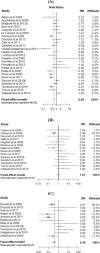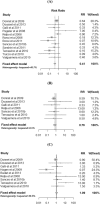Risk of medication overuse headache across classes of treatments for acute migraine
- PMID: 27882516
- PMCID: PMC5121112
- DOI: 10.1186/s10194-016-0696-8
Risk of medication overuse headache across classes of treatments for acute migraine
Abstract
Background: The most commonly prescribed medications used to treat migraine acutely are single analgesics, ergots, opioids, and triptans. Due to varying mechanisms of action across drug classes, there is reason to believe that some classes may be less likely than others to elicit Medication Overuse Headache (MOH) than others. We therefore aimed to determine whether certain classes of acute migraine drugs are more likely to elicit MOH than others.
Methods: A comprehensive systematic literature was conducted to identify studies of varying designs that reported on MOH within the considered treatment classes. Only studies that reported MOH according to the International Classification of Headache Disorders (ICHD) were considered. Since no causal comparative design studies were identified; data from prevalence studies and surveys were retrieved. Prevalence-based relative risks between treatment classes were calculated by integrating both medication overuse and medication use from published studies. For each pair wise comparison, pooled relative risks were calculated as the inverse variance weighted average.
Results: A total of 29 studies informed the relative risk between treatment classes, all of which reported country-specific data. Five studies reported country-specific medication use data. For triptans versus analgesics the study relative risks generally favored triptans. The pooled relative risk was 0.65 (i.e., relative risk reduction of 35 %). For ergots versus analgesics, a similar trend was observed in favor of ergots with a relative risk of 0.41. For triptans versus ergots, the direction of effect was mixed, and the pooled relative risk was 1.07. Both triptans and ergots appeared favorable when compared to opioids, with pooled relative risks of 0.35 and 0.76, respectively. However, the evidence was limited for these comparisons. Analgesics and opioids also appeared to yield similar risk of MOH (pooled relative risk 1.09).
Conclusion: Our study suggests that in patients receiving acute migraine treatment, analgesics and opioids are associated with a higher risk of developing MOH compared with other treatments. These findings provide incentive for better monitoring of use of analgesics and opioids for treating acute migraine, and suggest possible clinical preference for use of so-called "migraine-specific" treatments, that is, triptans and ergots.
Figures


References
-
- Headache Classification Committee of the International Headache Society (IHS). The International Classification of Headache Disorders, 3rd edition (beta version). Cephalalgia. 2013;33:629–808. - PubMed
Publication types
MeSH terms
Substances
LinkOut - more resources
Full Text Sources
Other Literature Sources
Medical

